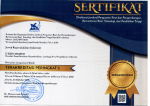DPSIR MODEL AS A TOOL TO ASSES LAND CONVERSION TARIFF POLICY IN YOGYAKARTA
Abstract
Land use change from agricultural land to non-agricultural purposes in Yogyakarta Special Province (DIY) is the main factor leading to the decrease of agricultural land. The increasing population growth has led to a higher demand for land, which is contributing to the rapid land use changes. Land scarcity has led to a change in land utilization within the city and in the surrounding area. The DPSIR Model is used as the basis for the impact assessment analysis on the tariff policy implementation regarding to the controlling of the land use change. Driving force in this model is migration and the pressure is land use change. The state is divided into three categories, state of economic dimension, environmental dimension, and social dimension. These have caused impacts on land degradation, threats to food security, and pollution. As the response to this, the government introduced the policy PERDA No. 53 Year 2007 about authorizing land use in DIY. This paper is intended to explain how the DPSIR model is used to assess the policy implementation.
Keywords
Full Text:
PDFReferences
Adji, T. N., Marwasta, D., & Nurjani, E. (2007). Pemodelan recharge air tanah tahunan Kotamadya Yogyakarta. Yogyakarta: Fakultas Geografi.
Agus, F., Watung, R. L., Suganda, H., Tala'ohu, S. H., Wahyunto, Sutono, S., . . . Kundarto, M. (2002). Assesment of environmental Multifunction of paddy farming in Citarum river basin West Java,Indonesia. Multifunction and Agricultural Land Conversion. Bogor: Puslitanak Departemen Pertanian.
Badan Perencanaan Pembangunan Daerah DI Yogyakarta [BAPPEDA DI Yogyakarta]. (2009). Rencana Pembangunan Jangka Menengah 2009-2013. Yogyakarta: BAPPEDA.
Guipponi, C. (2002). From the DPSIR reporting framework to a system for a dynamic and integrated decision making process. European Policy and Tools for Sustainable Water Management. Venice: Italy.
Iqbal, M., & Budhi, G. S. (2008). Perspective of Agri-Environment Service Incentives in Indonesia, Developing Countries and OECD Members. Forum Penelitian Agro Ekonomi, 1-16.
Kristensen, P. (2004). The DPSIR framework. Comprehensive Assessment of the Vulnerability of Water Resources to Environmental Change in Africa River Basin. Nairobi.
LUPIS Indonesia. (2010). Proposing Scenarios to Overcome Land Use Change in Yogyakarta. Graduate and Post-Graduate Workshop. Yogyakarta: Gadjah Mada University.
Marwasta, D. (2010). Urban Growth versus Smart Growth: Towards Yogyakarta Slow City. (p. 10). Yogyakarta: Gadjah Mada University.
Odermatt, S. (2004). Evaluation of Mountain Case Studies by Means of Sustainability Variables: A DPSIR Model as an Evaluation Tool in the Context of the North-South Discussion. Mountain Research and Development Vol 24 (4), 336-341. Retrieved from : http://www.jstor.org/stable/3674512
Purwanta, B. (2008). Metode Penentuan Disinsentif Pajak Bumi Bangunan Berdasarkan Penyimpangan Pemanfaatan Objek pajak Terhadap Rencana Tata Ruang. Bandung: Bandung Institute of Technology.
Randal, A. (1987). Resource economics : An economic approach to natural resource and environmental policy. New York: John Wiley and Sons Inc.
Sisiana, E. (2005). The Implication of Land Use Change from Wetland Into Residence Estate on Property NJOP in Karawang. Bandung: Bandung Institute of Technology.
Subanu, L. (2008). Governing urban development in Dualizing Societies : A Case Study of The Urban Region of Yogyakarta,Indonesia. In T. Kidokoro, N. Harata, L. P. Subanu, J. Jessen, A. Motte, & E. P. Seltzer (Eds.), Sustainable City regions : Space,Place and Governance. Japan: Springer. crossref
DOI: https://doi.org/10.14203/jki.v10i2.70
Copyright (c) 2015 Jurnal Kependudukan Indonesia

This work is licensed under a Creative Commons Attribution-NonCommercial-ShareAlike 4.0 International License.
-----------------------------------------------------------------------------------------------------------------------------
Research Center for Population, Indonesian Institute of Sciences
Widya Graha Building, 7th and 10th floors
Jl. Jenderal Gatot Subroto 10 Jakarta Selatan, Telp (021) 5221687
Website: http:/kependudukan.lipi.go.id;
E-Journal: http://ejurnal.kependudukan.lipi.go.id
Pustaka: http://pustaka.kependudukan.lipi.go.id
-----------------------------------------------------------------------------------------------------------------------------








